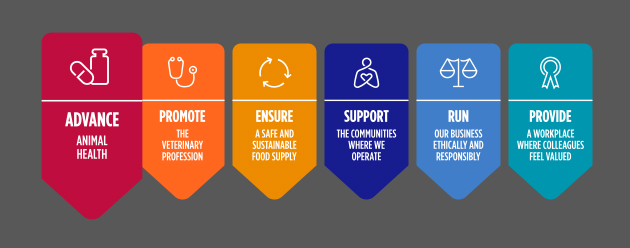
Our Responsibilities to Society: A Closer Look at How Zoetis Advances Animal Health
March 6, 2017
Recently, Zoetis introduced our Six Areas of Responsibility, which define how we make an impact on society while creating value for our business. This article, the first in a series on our corporate social responsibility program, examines how we at Zoetis advance animal health by solving the health challenges facing our customers.
Recently, Zoetis introduced our Six Areas of Responsibility, which define how we make an impact on society while creating value for our business. This article, the first in a series on our corporate social responsibility program, examines how we at Zoetis advance animal health by solving the health challenges facing our customers.
At Zoetis, we understand the single most important thing we do is to advance animal health. We do this by solving health challenges, controlling infectious disease, being the partner of choice in animal health and striving to be a leader in digital innovation.
Solving health challenges through innovation
We focus our research and development on addressing the pressing animal health challenges facing our veterinarian and livestock customers. A recent example of novel innovation from Zoetis is CytopointTM, the first monoclonal antibody licensed in the U.S. to help control the clinical signs associated with atopic dermatitis in dogs. The development of Cytopoint exemplifies Zoetis’ approach to innovation, acquiring an understanding of the biology of diseases in the animal species we serve and developing novel, targeted and effective treatments based on these new insights.
Allergic skin conditions in dogs are complex, and veterinarians have told us that allergic dogs and their owners have a variety of needs. Zoetis used a collaborative, multi-disciplinary, and team-oriented approach to develop better insights into the pathways of canine allergic skin disease. This work deepened our scientific understanding of cytokines (messenger proteins), such as interleukin–31 (IL-31), which play a key role in triggering many of the clinical signs of the disease, such as itching and inflammation. By understanding the pathway of allergic skin disease at the molecular level, Zoetis delivered two innovative therapies Cytopoint, which neutralizes IL-31 and Apoquel®, which inhibits the function of a variety of allergic, itch and pro-inflammatory cytokines dependent on Janus kinase (JAK) enzyme activity. Both are the first and only products on the market in their class.
Monoclonal antibodies offer a unique biological approach to solving health challenges: they are targeted to specific proteins, they are long-lasting, and they are safe. When the Zoetis team looked for ways to neutralize IL-31, they concluded that a monoclonal antibody could be an effective solution. As a result, Cytopoint was brought to market first in the United States under conditional license in August 2015 and was granted full licensure in December 2016. It is also conditionally licensed in Canada and recently received a positive opinion from the Committee for Medicinal Products for Veterinary Use (CVMP) of the European Medicines Agency.